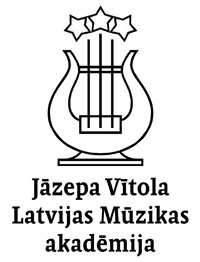Jāzeps Vītols Latvian Academy of Music
Jāzeps Vītols Latvian Academy of Music (previously Latvian Conservatoire) was founded in 1919. It offers 13 state-accredited undergraduate,  graduate and doctoral full-time study programmes including music performance, conducting, composition, music science, music pedagogy and choreography. A variety of optional courses gives a wide choice of subjects for study in addition to the mandatory ones. Academy hosts 16 departments that govern the academic staff and organize the academic activities of the institution. The Academy has a student symphony orchestra and a mixed choir performing under Latvian and foreign conductors, as well as an organ class and a large music library with over 150`000 scores, books and records.
graduate and doctoral full-time study programmes including music performance, conducting, composition, music science, music pedagogy and choreography. A variety of optional courses gives a wide choice of subjects for study in addition to the mandatory ones. Academy hosts 16 departments that govern the academic staff and organize the academic activities of the institution. The Academy has a student symphony orchestra and a mixed choir performing under Latvian and foreign conductors, as well as an organ class and a large music library with over 150`000 scores, books and records.
Brief History of the Academy
Latvian Conservatoire was founded in 1919 following the famous St. Petersburg Conservatoire (one year after the proclamation of the independent Republic of Latvia) and officially opened in 1920 at Kr. Barona 1, Riga, Latvia. Its first and at the same time most famous rector of Conservatoire was Jāzeps Vītols (1919-1935/1937-1944), who previously was working in St. Petersburg Conservatoire for 30 years. Conservatoire played a major role in developing music culture by raising good music teachers, choir and orchestra conductors, composers, conductors, performers and singers.
After the II World War Republic of Latvia was incorporated into the Soviet Union and Conservatoire became part of a larger system with all its achievements and deficiencies. Following rectors were Alfrēds Kalniņš (1944-1948), Jēkabs Mediņš (1948-1950), Jānis Ozoliņš (1951-1977). Imants Kokars (1977-1990), Juris Karlsons (1990-2007) and Artis Sīmanis (2007 – present). Worth to mention that, due to the important role of its first rector since 1991 Conservatoire is named to Jāzeps Vītols Latvian Academy of Music.
International Cooperation
Since regaining state independence Academy and Latvian musicians rapidly increased the scale of international contacts. Studying abroad, Socrates/Erasmus programme students in Academy, participation and winning in international competitions, masterclasses and festivals now have become an almost everyday routine. These positive developments have led to the rapid development of classic music education programmes in the Academy. Students and teachers also have the chance to participate in international exchange programmes in the framework of Sibelius, Expansiva, NordTrad, and NorJazz networks. It is also possible to study, research and have joint performances with Russian ( P. Tchaikovski Moscow State Conservatory, N. Rimski-Korsakov St. Petersburg Conservatory) and Belorussian (Belarussian State Academy of Music) colleagues.
Honorary Profesors
- Ādams Veņavskis
- Aleksandrs Glazunovs
- Alfrēds Kalniņš
- Andrejs Jurjāns
- Arnolds Klotiņš
- Arturs Ozoliņš
- Ausma Derkēvica
- Barbru Marklunda – Pētersone
- Erki Melartins
- Gidons Krēmers
- Haralds Mednis
- Haralds Ritenbergs
- Harijs Masts
- Helmers Pavasars
- Helmūts Rillings
- Jans Branbergs
- Jans Tammas
- Jāzeps Mediņš
- Jāzeps Vītols
- Jozefs Fersters
- Karols Šimanovskis
- Kšištofs Pendereckis
- Lucs Kēlers
- Ludvigs Bētiņš
- Maija Saiva
- Mariss Jansons
- Mstislavs Rostropovičs
- Pēteris Vasks
- Raimonds Pauls
- Tālivaldis Ķeniņš
- Vensāns d’Endī
- Vilma Cīrule
- Volfgangs Vāgners
- Žermēna Heine – Vāgnere
Contact details
Address: Kr. Barona 1, Rīga, LV-1050, Latvija
E-mail: academy@jvlma.lv
Fax: 00 371 67820271
Study costs
Studies in JVLMA are free of cost (state-funded). Each year there are also some self-funded study places. Study costs for these places are from 2700 to 4800 euros/year. The typical bachelor study programme duration is 4 years and 2 years for Master’s. Students from Latvia can apply for study loans that cover most of these expenses. These loans have to be repaid within 10 years after finishing studies. Students from other countries can apply for student loans in their home country.
